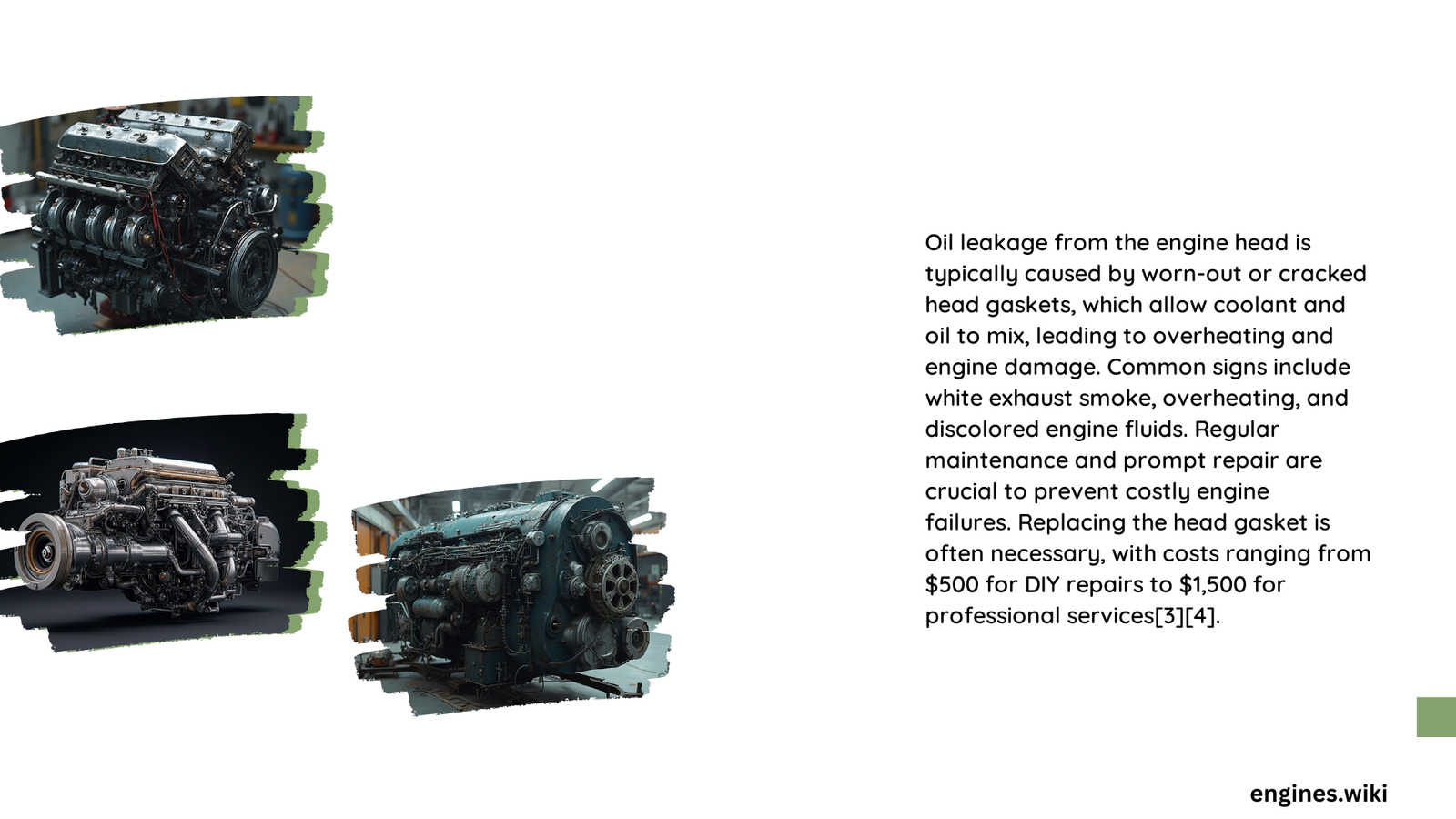Oil leakage from the engine head is a serious issue that can lead to engine damage and decreased performance. This problem occurs when oil escapes from the upper part of the engine, typically due to worn gaskets, cracked components, or poor maintenance. Understanding the causes, recognizing the symptoms, and knowing how to address oil leakage from the engine head is crucial for maintaining your vehicle’s health and avoiding costly repairs.
What Are the Main Causes of Oil Leakage from Engine Head?
Oil leakage from the engine head can be attributed to several factors:
-
Cylinder Head Gasket Failure: This is one of the most common causes. The head gasket seals the joint between the cylinder head and the engine block. When it fails, oil can leak both internally and externally.
-
Cracked Cylinder Head: Severe overheating or manufacturing defects can cause the cylinder head to crack, leading to oil leaks.
-
Worn Valve Seals: These seals prevent oil from entering the combustion chamber. When they wear out, oil can leak past them.
-
Loose or Damaged Bolts: The bolts that secure the cylinder head can become loose or damaged over time, allowing oil to escape.
-
Poor Maintenance: Neglecting regular oil changes and inspections can lead to premature wear and eventual oil leaks.
How Can You Identify Oil Leakage from Engine Head?

Recognizing the signs of oil leakage from the engine head is crucial for early detection and prevention of further damage. Here are some key indicators:
- Visible Oil Spots: Look for oil puddles under your parked vehicle, especially near the front where the engine is located.
- Burning Oil Smell: If you notice a burning oil odor while driving, it could indicate oil leaking onto hot engine components.
- Blue Exhaust Smoke: This can occur when oil enters the combustion chamber due to internal leaks.
- Low Oil Level: Frequent need to top up oil between changes may indicate a leak.
- Engine Overheating: Oil leaks can sometimes lead to coolant contamination, causing the engine to overheat.
What Are the Consequences of Ignoring Oil Leakage from Engine Head?
Ignoring oil leakage from the engine head can lead to severe consequences:
- Engine Damage: Insufficient oil can cause increased friction and wear on engine components.
- Reduced Performance: Oil leaks can affect engine compression and overall performance.
- Fire Hazard: Oil leaking onto hot engine parts poses a fire risk.
- Environmental Impact: Leaking oil is harmful to the environment.
- Increased Repair Costs: What starts as a minor leak can escalate into a major repair if left unaddressed.
How Much Does It Cost to Repair Oil Leakage from Engine Head?
The cost of repairing oil leakage from the engine head can vary widely depending on the cause and extent of the damage. Here’s a breakdown of potential costs:
| Repair Type | Estimated Cost Range |
|---|---|
| Head Gasket Replacement | $1,000 – $2,500 |
| Valve Seal Replacement | $800 – $1,500 |
| Cylinder Head Repair/Replacement | $2,500 – $5,000+ |
| Minor Gasket or Seal Replacement | $200 – $600 |
These estimates include both parts and labor. The actual cost can be influenced by factors such as vehicle make and model, local labor rates, and the specific repair shop.
How Can You Prevent Oil Leakage from Engine Head?
Preventing oil leakage from the engine head involves regular maintenance and careful attention to your vehicle’s needs:
- Regular Oil Changes: Follow your vehicle manufacturer’s recommended oil change intervals.
- Use High-Quality Oil: Choose the right grade and quality of oil for your engine.
- Monitor Oil Levels: Check your oil level regularly and top up as needed.
- Address Overheating Promptly: Overheating can damage gaskets and seals, leading to leaks.
- Regular Inspections: Have your vehicle inspected by a professional mechanic periodically.
- Avoid Overfilling: Too much oil can create excess pressure and cause leaks.
- Replace Gaskets and Seals: Follow manufacturer recommendations for replacing these components.
What Are the Steps to Diagnose Oil Leakage from Engine Head?
Diagnosing oil leakage from the engine head involves a systematic approach:
- Visual Inspection: Look for oil stains or wet spots around the engine head area.
- Pressure Test: A mechanic can perform a pressure test to identify leaks in the cooling system, which can indicate head gasket failure.
- Compression Test: This can reveal internal leaks affecting cylinder compression.
- Oil in Coolant Check: Look for oil contamination in the coolant reservoir.
- Dye Test: A special dye can be added to the oil to make leaks more visible under UV light.
When Should You Seek Professional Help for Oil Leakage from Engine Head?
While minor oil leaks might be manageable with DIY solutions, it’s crucial to seek professional help in the following situations:
- Persistent or rapidly worsening leaks
- Signs of internal leaks (oil in coolant or vice versa)
- Significant loss of oil between changes
- Engine performance issues or overheating
- Lack of experience or tools for proper diagnosis and repair
A professional mechanic has the expertise and equipment to accurately diagnose and repair oil leakage from the engine head, potentially saving you from more extensive and expensive repairs down the line.
Remember, oil leakage from the engine head is not a problem to be ignored. Prompt attention and regular maintenance are key to keeping your engine healthy and avoiding costly repairs. If you suspect an oil leak, don’t hesitate to consult with a qualified mechanic to ensure your vehicle’s longevity and performance.
